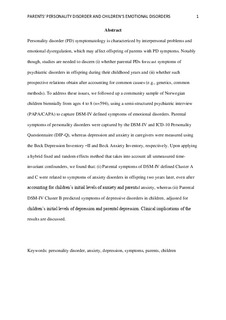| dc.contributor.author | Steinsbekk, Silje | |
| dc.contributor.author | Berg-Nielsen, Turid Suzanne | |
| dc.contributor.author | Belsky, Jay | |
| dc.contributor.author | Helland, Elisabeth Berg | |
| dc.contributor.author | Hågenrud, Marte | |
| dc.contributor.author | Raballo, Andrea | |
| dc.contributor.author | Wichstrøm, Lars | |
| dc.date.accessioned | 2020-03-03T09:38:14Z | |
| dc.date.available | 2020-03-03T09:38:14Z | |
| dc.date.created | 2019-09-13T15:15:08Z | |
| dc.date.issued | 2019 | |
| dc.identifier.citation | Journal of Abnormal Child Psychology. 2019, 47 (12), 1931-1943. | nb_NO |
| dc.identifier.issn | 0091-0627 | |
| dc.identifier.uri | http://hdl.handle.net/11250/2644835 | |
| dc.description.abstract | Personality disorder (PD) symptomatology is characterized by interpersonal problems and emotional dysregulation, which may affect offspring of parents with PD symptoms. Notably though, studies are needed to discern (i) whether parental PDs forecast symptoms of psychiatric disorders in offspring during their childhood years and (ii) whether such prospective relations obtain after accounting for common causes (e.g., genetics, common methods). To address these issues, we followed up a community sample of Norwegian children biennially from ages 4 to 8 (n = 594), using a semi-structured psychiatric interview (PAPA/CAPA) to capture DSM-IV defined symptoms of emotional disorders. Parental symptoms of personality disorders were captured by the DSM-IV and ICD-10 Personality Questionnaire (DIP-Q), whereas depression and anxiety in caregivers were measured using the Beck Depression Inventory –II and Beck Anxiety Inventory, respectively. Upon applying a hybrid fixed and random effects method that takes into account all unmeasured time-invariant confounders, we found that: (i) Parental symptoms of DSM-IV defined Cluster A and C were related to symptoms of anxiety disorders in offspring two years later, even after accounting for children’s initial levels of anxiety and parental anxiety, whereas (ii) Parental DSM-IV Cluster B predicted symptoms of depressive disorders in children, adjusted for children’s initial levels of depression and parental depression. Clinical implications of the results are discussed. | nb_NO |
| dc.language.iso | eng | nb_NO |
| dc.publisher | Springer | nb_NO |
| dc.title | Parents' personality-disorder symptoms predict children's symptoms of anxiety and depressive disorders - a prospective cohort study | nb_NO |
| dc.type | Journal article | nb_NO |
| dc.type | Peer reviewed | nb_NO |
| dc.description.version | acceptedVersion | nb_NO |
| dc.source.pagenumber | 1931-1943 | nb_NO |
| dc.source.volume | 47 | nb_NO |
| dc.source.journal | Journal of Abnormal Child Psychology | nb_NO |
| dc.source.issue | 12 | nb_NO |
| dc.identifier.doi | 10.1007/s10802-019-00568-9 | |
| dc.identifier.cristin | 1724556 | |
| dc.description.localcode | This is a post-peer-review, pre-copyedit version of an article. Locked until 13.6.2020 due to copyright restrictions. The final authenticated version is available online at: https://doi.org/10.1007/s10802-019-00568-9 | nb_NO |
| cristin.unitcode | 194,67,40,0 | |
| cristin.unitcode | 1920,18,0,0 | |
| cristin.unitname | Institutt for psykologi | |
| cristin.unitname | PH - Barne- og ungdomspsykiatrisk klinikk | |
| cristin.ispublished | true | |
| cristin.fulltext | postprint | |
| cristin.qualitycode | 2 | |
